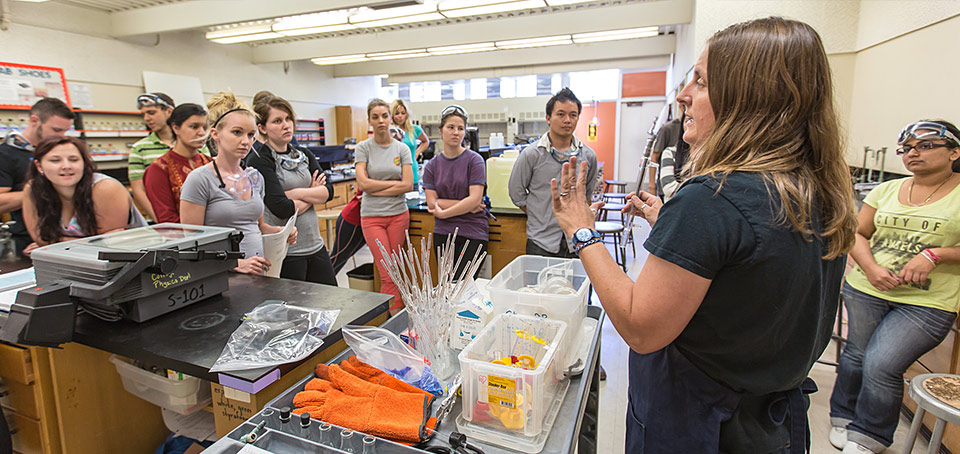
Contact Information

- Division
- Sciences and Mathematics
- Dean
- Heather Roberts
- Associate Dean
- Karen Warburton

- Division Office
- V 211, Rocklin Campus
Overview
The Chemistry program at Sierra College is designed to meet the needs of the diverse community of interests served by the community college. A full program of chemistry for the professional scientist is offered through analytical chemistry and a two-semester course in organic chemistry. A separate track is offered for nursing students that presents general inorganic, organic and biochemistry in a one-year sequence. The Chemistry Department also has a strong commitment to the student with no prior chemistry, or to those whose background is weak.
The entire program is taught with a strong emphasis on the laboratory. In the more advanced classes, students receive hands-on experience with a wide variety of instruments.
TRANSFER MAJOR REQUIREMENTS in Chemistry are available in the Counseling Center. In all cases, students should consult with a counselor for specific transfer requirements. Four-year graduates in Chemistry are qualified for positions in research, industry, education, engineering and the allied medical fields.
Faculty
Michael C. Brelle
Professor, Chemistry
B.S., California State University, Chico
Ph.D., University of California, Santa Cruz
Florence (Nini) M. Cardoza
Professor, Chemistry
B.A., San Francisco College for Women
M.S., University of California, San Francisco
Keri Clemens
Professor, Chemistry
B.S., University of California, Davis
Ph.D., University of California, Davis
Pamela H. Gamel
Professor, Chemistry
B.S., University of California, Davis
M.S., University of California, San Francisco
Jason R. Giuliani
Professor, Chemistry
B.S., California State University, Chico
Ph.D., University of California, Davis
Stuart D. Hay
Assistant Professor, Chemistry
B.S., California Polytechnic State University, San Luis Obispo
M.S., California State University, Sacramento
Susan L. Kurnett
Assistant Professor, Chemistry
B.A., University of California, Irvine
M.S., California State University, Sacramento
Rhiannon Porter
Assistant Professor, Chemistry
B.S., California Polytechnic State University, San Luis Obispo
Ph.D., University of California, Davis
Trevor Roberti
Assistant Professor, Chemistry
B.S., California State University, Long Beach
Ph.D., University of California, Santa Cruz
Mark F. Springsteel
Professor, Chemistry
B.S., California State University, Fullerton
Ph.D., University of California, Davis
Degrees/Certificates
Chemistry for Transfer
AS-T Degree
This program provides students with a strong foundation in chemistry, covering the composition, structure, properties, and reactions of substances. Courses in general chemistry, organic chemistry, physics, and calculus are required. Upon completion of this degree, students will demonstrate proficiency in chemistry concepts and scientific communication, and apply critical thinking skills to problem solving.
The Associate in Science in Chemistry for Transfer degree (AS-T) prepares students to transfer into the CSU system to complete a bachelor’s degree in chemistry, or a major deemed similar by a CSU campus. Students earning an associate degree for transfer and meeting the CSU minimum transfer admission requirements are guaranteed admission with junior standing within the CSU system. Students are also given priority admission consideration to their local CSU campus but not to a particular campus or major. Upon transfer, students will be required to complete no more than 60 additional prescribed units to earn a bachelor’s degree.
To earn the Associate in Science in Chemistry for Transfer degree, students must complete 60 CSU-transferable semester units with a minimum grade point average of 2.0, including both of the following:
- completion of all courses required for the major with grades of “C” or better; and
- completion of the Intersegmental General Education Transfer Curriculum for Science, Technology, Engineering or Mathematics (IGETC for STEM) pattern.1 (Students transferring to a CSU campus must complete Area 1C Oral Communication to be eligible for admission.)
NOTE: The California State University General Education Breadth pattern (CSU GE) is NOT an option for this degree.
The exact wording of the law pertaining to associate degrees for transfer may be found in Education Code Section 66746.
It is highly recommended that, prior to transferring, students complete courses that satisfy the CSU United States History, Constitution and American Ideals graduation requirement. In all cases, students should consult with a counselor for more information on university admission and transfer requirements.
RESTRICTION: International coursework from non-United States regionally accredited institutions cannot be applied to associate degrees for transfer.
Required Courses
| Code | Title | Units |
|---|---|---|
| CHEM 0001A | General Chemistry I (OR) | 5-6 |
| or CHEM 0003A & CHEM 0003B | General Chemistry I - Part 1 and General Chemistry I - Part 2 | |
| CHEM 0001B | General Chemistry II | 5 |
| CHEM 0012A | Organic Chemistry I | 5 |
| CHEM 0012B | Organic Chemistry II | 5 |
| PHYS 0205 | Principles of Physics: Mechanics | 4 |
| PHYS 0205L | Principles of Physics Laboratory: Mechanics | 1 |
| PHYS 0210 | Principles of Physics: Electricity and Magnetism | 3 |
| PHYS 0210L | Principles of Physics Laboratory: Electricity and Magnetism | 1 |
| MATH 0030 | Analytical Geometry and Calculus I | 4 |
| MATH 0031 | Analytical Geometry and Calculus II | 4 |
| Total Units | 37-38 | |
| 1 | IGETC for STEM is only an option for students earning AS-T degrees in Biology for Transfer and/or Chemistry for Transfer. IGETC for STEM certification requires the following courses before transfer:
The following deferred courses must be completed after transfer:
(The deferred lower-division courses must be replaced with calculus and/or science courses that are required to be taken before transfer to the university.) |
Chemistry
AS Degree
The Chemistry major recognizes a concentration in the field of Chemistry. Successful completion of the curriculum in Chemistry and the associated electives prepare Chemistry students for transfer to four-year colleges or universities. In all cases, students should consult with a counselor for more information on university admission and transfer requirements. Students must fulfill the following major requirements with grades of “C” or better, complete a minimum of 60 degree-applicable semester units (12 of which must be completed at Sierra College) with a grade point average of at least 2.0 and complete one of the following three general education patterns:
- Sierra College Associate Degree Requirements;
- California State University General Education Breadth (CSU GE) pattern;
- Intersegmental General Education Transfer Curriculum (IGETC).
Required Courses
| Code | Title | Units |
|---|---|---|
| CHEM 0001A | General Chemistry I (OR) | 5-6 |
| or CHEM 0003A & CHEM 0003B | General Chemistry I - Part 1 and General Chemistry I - Part 2 | |
| CHEM 0001B | General Chemistry II | 5 |
| CHEM 0005 | Chemistry - Quantitative Analysis | 4 |
| CHEM 0012A | Organic Chemistry I | 5 |
| CHEM 0012B | Organic Chemistry II | 5 |
| Total Units | 24-25 | |
Recommended Electives
| Code | Title | Units |
|---|---|---|
| MATH 0030 | Analytical Geometry and Calculus I | 4 |
| MATH 0031 | Analytical Geometry and Calculus II | 4 |
| MATH 0032 | Analytical Geometry and Calculus III | 4 |
| PHYS 0205 & 0205L | Principles of Physics: Mechanics and Principles of Physics Laboratory: Mechanics | 5 |
| PHYS 0210 & 0210L | Principles of Physics: Electricity and Magnetism and Principles of Physics Laboratory: Electricity and Magnetism | 4 |
| PHYS 0215 & 0215L | Principles of Physics: Heat, Waves and Modern Physics and Principles of Physics Laboratory: Heat, Waves and Modern Physics | 4 |
Courses
Understanding course descriptions
CHEM 0000A. Foundations of College Chemistry
Units: 4
Prerequisite: Completion of first year high school algebra or MATH A with grade(s) of "C" or better; eligibility for ENGL 50 or ENGL N
Advisory: Eligibility for ENGL 1A
Hours: 108 (54 lecture, 54 laboratory)
A nontransferable course primarily intended to prepare students for general college chemistry. Includes a brief review of math operations important in chemistry, metric system, formulas, equations, gas laws, and solutions through related lecture and laboratory exercises. (not transferable)
CHEM 0001A. General Chemistry I
Units: 5
Prerequisite: Completion of CHEM A or equivalent with grade of "C" or better; and completion of MATH D with grade of "C" or better, or placement by matriculation assessment process, or equivalent; and satisfactory score on the Chemistry Placement Examination
Advisory: Eligibility for ENGL 11 strongly recommended
Hours: 162 (54 lecture, 108 laboratory)
Introduction to the general principles of chemistry with emphasis upon quantitative relationships. Properties of matter related whenever possible to present concepts of atomic structure and to the periodic table. Includes atomic structure, the mole concept, gas laws, stoichiometry, redox, states of matter, solutions, and an introduction to modern theories of chemical bonding through related lecture and laboratory exercises. Students enrolling in CHEM 1A after having completed CHEM 3A will lose credit for CHEM 3A. Note: Not open to students who have completed CHEM 3B. CHEM 1A/1B sequence may be started any semester. (C-ID CHEM 110) (combined with CHEM 1B, C-ID CHEM 120S) (CSU, UC-with unit limitation)
CHEM 0001B. General Chemistry II
Units: 5
Prerequisite: Completion of CHEM 1A or 3B with grade of "C" or better
Advisory: Eligibility for ENGL 11 strongly recommended
Hours: 162 (54 lecture, 108 laboratory)
A continuation of CHEM 1A. Includes modern theories of bonding, acid-base theory, equilibrium, thermodynamics, electro-chemistry, nuclear chemistry, chemical kinetics, and a brief introduction to organic and biochemistry through related lecture and laboratory exercises. Note: CHEM 1A/1B sequence may be started any semester. (combined with CHEM 1A or CHEM 3A/3B, C-ID CHEM 120S) (CSU, UC-with unit limitation)
CHEM 0001X. Problem Solving for Chemistry 1A
Unit: 1
Prerequisite: Completion of CHEM A or equivalent with grade of "C" or better; and completion of MATH D with grade of "C" or better, or placement by matriculation assessment process, or equivalent; and satisfactory score on the Chemistry Placement Examination
Corequisite: Concurrent enrollment in CHEM 1A
Advisory: Eligibility for ENGL 11 strongly recommended
Hours: 18 lecture
Optional problem solving course to accompany CHEM 1A. Students use critical thinking and problem solving strategies to solve general chemistry problems in topics that include atomic structure, the mole concept, gas laws, stoichiometry, redox, intermolecular forces, solid state chemistry, solution chemistry, and chemical bonding. (CSU)
CHEM 0001Y. Problem Solving for Chemistry 1B
Unit: 1
Prerequisite: Completion of CHEM 1A or 3B with grade of "C" or better
Corequisite: Concurrent enrollment in CHEM 1B
Advisory: Eligibility for ENGL 11 strongly recommended
Hours: 18 lecture
Optional problem solving course to accompany CHEM 1B. Students use critical thinking and problem solving strategies to solve general chemistry problems in topics that include equilibrium, chemical kinetics, acid-base theory, thermodynamics, electro-chemistry, nuclear chemistry, and brief introductions to organic and biochemistry. (CSU)
CHEM 0002A. Introduction to Chemistry I
Units: 5
Prerequisite: Completion of MATH A with grade of "C" or better, or placement by matriculation assessment process, or equivalent
Advisory: Eligibility for ENGL 1A; completion of CHEM A with grade of "C" or better or equivalent; completion of MATH D with grade of "C" or better or equivalent
Hours: 162 (54 lecture, 108 laboratory)
Designed to meet the requirements for certain nursing, dental hygiene, physical therapy, agriculture, and forestry programs (Inorganic Chemistry). An introduction to the fundamental principles of general inorganic chemistry through related lecture and laboratory exercises. (C-ID CHEM 101) (CSU, UC-with unit limitation)
CHEM 0002B. Introduction to Chemistry II
Units: 5
Prerequisite: Completion of CHEM 2A with grade of "C" or better
Advisory: Eligibility for ENGL 1A
Hours: 162 (54 lecture, 108 laboratory)
Designed to meet the requirements for certain nursing, dental hygiene, physical therapy, agriculture, and forestry programs (Organic and Biochemistry). A study of the major classes of organic compounds, including nomenclature structure, properties, and isomerism. Emphasizes the chemistry and metabolism of carbohydrates, lipids, and proteins, including nucleo-protein and enzymes through related lecture and laboratory exercises. (C-ID CHEM 102) (CSU, UC-with unit limitation)
CHEM 0002X. Problem Solving for Chemistry 2A
Unit: 1
Prerequisite: Completion of one year high school algebra or MATH A with grade of "C" or better
Corequisite: Concurrent enrollment in CHEM 2A
Advisory: Eligibility for ENGL 1A; completion of high school chemistry or CHEM A with grade of "C" or better; completion of two years of high school algebra or MATH D with grade(s) of "C" or better
Hours: 18 lecture
Optional problem solving course to accompany CHEM 2A. Students use critical thinking and problem solving strategies to solve chemistry problems in topics that include atomic structure, the mole concept, gas laws, stoichiometry, redox, acid-base theory, equilibrium, nuclear chemistry, and chemical bonding. (CSU)
CHEM 0002Y. Problem Solving for Chemistry 2B
Unit: 1
Prerequisite: Completion of CHEM 2A with grade of "C" or better
Corequisite: Concurrent enrollment in CHEM 2B
Advisory: Eligibility for ENGL 1A
Hours: 18 lecture
Optional problem solving course to accompany CHEM 2B. Students use critical thinking and problem solving strategies to solve organic and biochemistry problems. Both lecture and discussion groups utilized. (CSU)
CHEM 0003A. General Chemistry I - Part 1
Units: 3
Prerequisite: Completion of MATH D with grade of "C" or better, or placement by matriculation assessment process, or equivalent
Corequisite: Concurrent enrollment in CHEM 3X
Advisory: Eligibility for ENGL 11 strongly recommended
Hours: 90 (36 lecture, 54 laboratory)
The first semester of a two-semester course in general chemistry consisting of that material normally included in one semester of CHEM 1A. Topics covered include the mole concept, chemical nomenclature, gas laws, and stoichiometry. This sequence fulfills the prerequisite for CHEM 1B. Students enrolling in CHEM 1A after having taken CHEM 3A will lose credit for CHEM 3A. (combined with CHEM 3B, C-ID CHEM 110) (combined with CHEM 3B and 1B, C-ID CHEM 120S) (CSU, UC-with unit limitation)
CHEM 0003B. General Chemistry I - Part 2
Units: 3
Prerequisite: Completion of CHEM 3A with grade of "C" or better
Corequisite: Concurrent enrollment in CHEM 3Y
Advisory: Eligibility for ENGL 11 strongly recommended
Hours: 90 (36 lecture, 54 laboratory)
The second semester of a two-semester course in general chemistry consisting of that material normally included in one semester of CHEM 1A. Topics include atomic structure, states of matter, solutions, and chemical bonding. This sequence fulfills the prerequisite for CHEM 1B. (combined with CHEM 3A, C-ID CHEM 110) (combined with CHEM 3A and 1B, C-ID CHEM 120S) (CSU, UC-with unit limitation)
CHEM 0003X. Problem Solving for Chemistry 3A
Units: 2
Prerequisite: Completion of MATH D with grade of "C" or better, or placement by matriculation assessment process, or equivalent
Corequisite: Concurrent enrollment in CHEM 3A
Advisory: Eligibility for ENGL 11 strongly recommended
Hours: 36 lecture
Problem solving course to accompany CHEM 3A. Students use critical thinking and problem solving strategies to solve general chemistry problems in topics that include the mole concept, chemical nomenclature, gas laws, and stoichiometry. (pass/no pass grading) (not transferable)
CHEM 0003Y. Problem Solving for Chemistry 3B
Units: 2
Prerequisite: Completion of CHEM 3A with grade of "C" or better
Corequisite: Concurrent enrollment in CHEM 3B
Advisory: Eligibility for ENGL 11 strongly recommended
Hours: 36 lecture
Problem solving course to accompany CHEM 3B. Students use critical thinking and problem solving strategies to solve general chemistry problems in topics that include atomic structure, chemical bonding, states of matter, and solutions. (pass/no pass grading) (not transferable)
CHEM 0005. Chemistry - Quantitative Analysis
Units: 4
Prerequisite: Completion of CHEM 1B with grade of "C" or better
Advisory: Eligibility for ENGL 11 strongly recommended
Hours: 144 (36 lecture, 108 laboratory)
Theory and techniques of quantitative chemical measurement, including gravimetric, volumetric, and introductory instrumental analysis. Required for all chemistry, chemical engineering, medicine, dentistry, veterinary medicine, and related majors. (CSU, UC)
CHEM 0012A. Organic Chemistry I
Units: 5
Prerequisite: Completion of CHEM 1B with grade of "C" or better
Advisory: Eligibility for ENGL 11 strongly recommended
Hours: 162 (54 lecture, 108 laboratory)
An extensive course in the chemistry of the compounds of carbon, which emphasizes structure, kinetics, thermodynamics, spectroscopy, and synthesis. The laboratory provides direct experience with the reaction, synthesis, purification, identification, and characterization (IR, GC, TLC, bp, mp, chemical tests) of organic compounds. Discussions about the emerging field of "Green Chemistry" and performance of Green Chemistry experiments in the laboratory. Required for majors in chemistry as well as many other related fields. (C-ID CHEM 150; and, combined with CHEM 12B, C-ID CHEM 160S) (CSU, UC)
CHEM 0012B. Organic Chemistry II
Units: 5
Prerequisite: Completion of CHEM 12A with grade of "C" or better
Advisory: Eligibility for ENGL 11 strongly recommended
Hours: 162 (54 lecture, 108 laboratory)
Focuses on carbon based molecules and emphasizes structure, kinetics, thermodynamics, spectroscopy, and synthesis. Includes the emerging field of "Green Chemistry." Required for majors in Chemistry as well as many other related fields. (combined with CHEM 12A, C-ID CHEM 160S) (CSU, UC)
CHEM 0028. Independent Study
Units: 1-3
Designed for students interested in furthering their knowledge at an independent study level in an area where no specific curriculum offering is currently available. Independent study might include, but is not limited to, research papers, special subject area projects, and research projects. See Independent Study page in catalog. (CSU, UC-with unit limitation)
CHEM 0095. Internship in Chemistry
Units: 0.5-4
Designed for advanced students to work in an area related to their educational or occupational goal. Provides new on-the-job technical training under the direction of a worksite supervisor, allowing students to expand knowledge and skills in the chosen field. Mandatory orientation session and faculty approval to determine eligibility. Students may earn up to a total of 16 units in internship courses (any course numbered 95 and PDEV 94). (CSU-with unit limitation)



